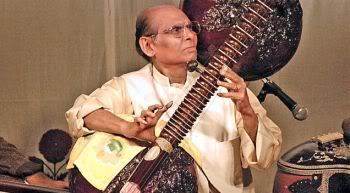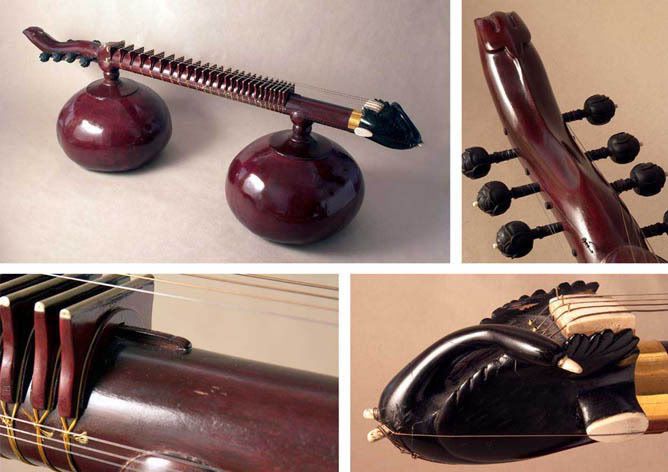Education India Indian music music Personal: aesthetics Education genius India Indian music music obituary
by Warren
2 comments
Meta
SiteMeter
Brighter Planet
A Great Tree Has Fallen: Asad Ali Khan, R.I.P.
This Tuesday, June 14, the world of music lost a great spirit.
Ustad Asad Ali Khan, one of the few remaining performers on the ancient Indian stringed instrument called the Rudra Veena, passed away after suffering a heart attack in the early hours of the morning.

He performed an austere and sober style of music, an instrumental version of the vocal style known as Dhrupad, which dates back to the 11th century or so. The Rudra Veena, or Been, is considered to be one of the oldest instruments of Indian tradition; it has its own origin myth, which states that the instrument sprang full-blown from the forehead of a meditating Lord Shiva. It is interesting that Asad Ali Khan, whose name makes his Muslim ancestry evident, saw no religious conflict in embracing this story; ecumenicism in Indian musical traditions is alive and well.
Raga Darbari Kanada, with Pandit Gopal Das on pakhawaj, 1998. This is an excerpt from a concert performance which lasted several hours.
=====================================================
Here is part of the Wiki page on Ustad Asad Ali Khan, with my interpolations in bold:
Khan was born 1937 in Alwar in the seventh generation of rudra veena players in his family. His ancestors were royal musicians in the courts of Rampur, Uttar Pradesh, and Jaipur, Rajasthan in the 18th century.[3][4]
Indian musical tradition places very high value on old knowledge, and thus being able to trace one’s musical ancestry back several hundred years is a way of privileging one’s training and credentials.
Khan grew up in a musical surrounding and was taught the Beenkar gharana (stylistic school of rudra veena playing) of Jaipur and vocals for fifteen years.
He was trained by family members in a highly restricted area of specialized knowledge. Indian musical tradition likewise places great value on exclusivity; it’s very common to hear particular songs or repertoire elements described as “rare.”
An article in DNAIndia tells us:
The musician, who received the Padma Bhushan in 2008 underwent training under his father Ustad Sadiq Ali Khan Beenakar. His father, grandfather Ustad Musharraf Ali Khan Beenakar and great-grandfather Ustad Rajab Ali Beenakar were court musicians in the princely state of Alwar where Ustad Asad Ali Khan was born in 1937.
His father later moved to the princely court of Rampur where he undertook to teach him music. For the next 15 years he learnt to play Rudra Veena, practicing 14 hours a day.
Indian television program: Raga Asavari. Those not interested in the Hindi commentary should jump the first video ahead a couple of minutes to hear his exquisite performance.
In an interview with the sitarist and musicologist Deepak Raja, Asad Ali Khan described the rigors of his traditional pedagogy.
In our gharana, we take the students through a three-stage training. The Been is an instrument of the Dhrupad genre and the gayaki ang (the vocalized idiom). Therefore, a musician is first trained as a vocalist, starting with the science of breath control and intonation, going on to the knowledge of a sufficient number of ragas, and several Dhrupad compositions in each raga. At the second stage, he is trained to apply his knowledge of Dhrupad vocalism to the sitar, which is an easier instrument to handle than the Been. At this stage, he also acquires knowledge of the rhythmic intricacies and improvisatory movements of the Dhrupad genre.
Once he acquires sufficient command over the sitar, he is allowed to graduate to the Been. We make sure that by this time, the student can sit for hours in the posture of Vajrasana. He has to start with Vajrasana from the first day, long before he holds the sitar. The transition from the sitar to the Been is a major one, as the most important aspects of playing – the mizrab (plectrum) angle, the placement of strings — are different. Gradually, the transition is achieved and the craft is transferred to the Been. Beyond this, the instrument teaches the musician its own art. An exceptionally talented and dedicated student can take up to ten years to go through these three stages of grooming. Most will take fifteen years to become respectable performers, if they have it in them.
The tenacity required to go through this process is rare in present times. The days of hereditary musicianship are over; so are the days of princely patronage, which supported it. Given the many options today, who would want to make a choice that may, or may not, pay off after ten or fifteen years? Music is no more a way of life. It is a profession. Musicians want recognition and money fast, and they will learn what gives them a quick take-off. Moreover, today people want to learn music – whether Been or something else – with different objectives. It may have nothing to do with wanting to perform.

Details of the Rudra Veena’s construction.
A friend and former student of mine spent six months learning music with Asad Ali a number of years ago. They worked together every day, three hours a day. On one note — in my friend’s case the major seventh of the scale. He said Khansaheb was never impatient, expressing the philosophy that anything worth doing was worth taking your time over. My friend didn’t have six years to cover the entire chromatic scale, and eventually moved on.
In The Hindu, singer Malti Gilani, recalls hearing Khansaheb perform when he was a young man:
I met Asad Ali Khan saheb in Calcutta in 1962 in the house of my guru Bade Ghulam Ali Khan saheb. He and Munawar Ali (my guru’s son) and Asad Ali were very close friends. I heard Asad Ali Khan in the house of Fahimuddin Dagar saheb one afternoon in 1963. He played raga Multani. (snip)
Raga Multani is an afternoon melody, when the trees throw long shadows on the ground. So the raga tries to evoke that atmosphere. And he played that, and we, including Bade Ghulam Ali Khan saheb, were all stunned. He was very young! In 1962 he must have been only 26.
In all his concerts would always give a little background about the Rudra veena; he said that it was like a representation of Saraswati mata. Whenever there is an image of Saraswati she is always holding the veena. It has two tumbas (like the Rudra veena).
Jawed Naqvi notes, in Pakistan’s Dawn, that:
Asad Ali Khan was the last of India’s legendary beenkars — practitioners of the ancient rudra veena. His orthodox grooming as a devout Shia Muslim had left enough space for him to be in obeisance to a deeply resonant string instrument that claimed lineage from Lord Shiva. (snip) Khan’s engagement with religion represented a multilayered dialectic between faith and music that straddles much of our region. In his increasingly Talibanised milieu though he was susceptible to being seen as a sinner.
The ustad’s dhrupad ang music enriched the rudra veena as an instrumental variant of dhrupad vocalism. The genre has been traditionally rooted in the celebration of Shiva as both a subject of adulation and as an invisible but ever-present audience.
He has left a significant body of recorded music, but no recording can do justice to the extraordinary clarity and focus he brought to his live performances. My wife and I heard him perform in the mid-90s at Harvard University, and we both experienced significant time-dilation, in which a concert four hours long was condensed into a single performative instant by his fierce concentration and uncompromising musicality. Gracious and unassuming in his interaction with listeners, he was severe and unforgiving when it came to his music and his instrument.
More of his music can be found online, for example, here. It’s worth the investment of time.
I hope that a thousand years from now, there are humans to marvel at the rich overtones and profound aesthetic sensations offered by Asad Ali Khan’s music — a link to an unimaginably distant past where our culture wasn’t moving a million miles an hour to nowhere.
Asad Ali Khan, 1937-2011. Requiesciat in pace.
Thanks for the article Warren. I liked his philosophy “anything worth doing is worth taking your time over”. Wish there was a way to reconcile this philosophy with today’s life. And, the Asavari was amazing.

A great loss indeed. I agree about the superb Asavari among the videos. Perfect in all detail.